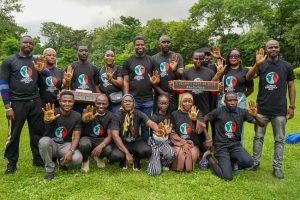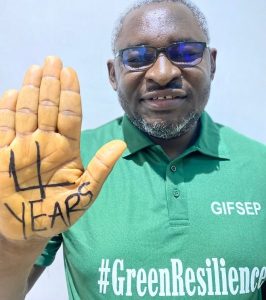As climate activists and thought leaders across the world commemorate this year’s edition of Climate Emergency Day on Monday, July 22, 2024, the need to intensify the fight against climate change is being collectively reinforced globally, once again.

This is very important as the Climate Clock will tick down below five years for the first time, a key milestone for humanity that will spark a wave of synchronised actions around the world, demanding an end to fossil fuels, and pushing leaders to #ActInTime to accelerate real climate solutions.
On this day, we will officially have 4 YEARS to dramatically reduce fossil fuel emissions to stay below 1.5C degrees warming. Every minute, every second counts. The deadline on the clock is sourced from the Intergovernmental Panel on Climate Change (IPCC) data, the gold standard of climate science. The first monumental Climate Clock was co-created by Gan Golan, Andrew Boyd, Katie Peyton Hofstadter, and Adrian Carpenter.
The first Climate Clock was launched in Union Square, New York City, in September 2020. Basically, it is a countdown mechanism that tracks the deadline to stay below 1.5°C of global warming. Notably, it now has a global presence, with monument-sized clocks installed in London, Prague, Rome, Seoul, and Harrisburg, Pennsylvania, and portable clocks in the hands of climate leaders across the world.
In addition, it is known for its 80-foot digital clock face in New York City’s Union Square, as well as its other large-scale clocks located across the globe in London, Rome, Seoul, Tokyo, Beijing and Harrisburg, Pennsylvania. Individuals and communities worldwide are encouraged to mark the moment the Clock ticks, which indicates that time is running out on us to take action to save our beloved planet.
Interestingly, it is a global symbol of urgency, melding art, science, tech, and grassroots mobilisation to alert people to the climate emergency and help enact hopeful, doable solutions in line with global commitments to the Paris Agreement that aims to keep global warming below 1.5°C to preserve a liveable world for all.
By and large, Climate Clock which has a global community of voices available for comment, including many local spokespeople and youth ambassadors, urges governments, corporations, and people in power to #ActInTime for the climate crisis. It exhibits a “Deadline” counting down the time remaining to prevent global warming from rising above 1.5°C and five “Lifelines” tracking progress on key solution pathways.
Why Climate Clock matters
The science is clear: Climate change is an urgent issue that affects us all. We are in a Climate Emergency. Decades of increasing carbon emissions are harming the natural and societal systems upon which humanity depends, threatening untold ecological and human devastation if we do not #ActInTime. If urgent steps are not taken the situation will only worsen and put us in more danger. The good news, however, is that there is still time. In other words, we can still have the chance to do something to prevent the worst impacts of climate change.

Backed by the latest science, the Climate Clock tells us what we must do, by when. The Deadline and Lifelines on the Climate Clock make explicit the speed and scope of action that political leaders must take in order to limit the worst climate impacts currently been experienced around the world including my native country, Nigeria.
The current climate impact in Nigeria is multifaceted and affects various sectors of the economy, environment, and society. Unpredictable and changing rainfall patterns have led to reduced agricultural productivity. Crops are either inundated by excessive rainfall or suffer from drought conditions, which disrupts planting and harvesting schedules.
Changes in rainfall patterns and prolonged dry seasons have led to water scarcity in many parts of the country affecting both rural and urban communities. Conversely, during the rainy season, heavy and intense rainfall can cause flooding as currently experienced in many parts of the country. Consequently, waterborne diseases such as cholera and typhoid, are prevalent as clean water becomes scarce.
In the northern regions, desertification is accelerating due to increased temperatures and reduced rainfall, leading to loss of arable land and displacement of communities while rising sea levels and increased storm surges are causing coastal erosion, threatening coastal communities, infrastructure, and ecosystems like mangroves.
The economic cost and impact of climate change on Nigeria’s economy is comparatively huge and is expected to increase. The Department for International Development (DFID) of the United Kingdom (UK) has, for example, estimated that climate change will cost Nigeria between 6 percent and 30 percent of its Gross Domestic Product (GDP) by 2050 if no concrete adaptation action is taken.
There is also the problem of loss of livelihoods, particularly amongst a huge population of Nigerians who rely on agriculture, fisheries, and natural resources for their source of income. Climate impacts on these sectors can lead to loss of income and increased poverty.
Similarly, extreme weather events such as floods and storms can damage infrastructure, including roads, bridges, and buildings, leading to high repair and replacement costs. Notably, in the energy supply sub-sector, hydropower, a significant source of Nigeria’s electricity, is affected by changes in water availability due to droughts and changing rainfall patterns.
It is equally pertinent to mention that the social and political impacts of climate change cannot be overlooked, conflict is on the increased in some parts of the country because of the competition over dwindling natural resources, such as water and arable land, which exacerbate existing conflicts or trigger new ones, particularly in regions already experiencing tension leading to displacement and migration of the people.
What are we supposed to do?
The big question now is what type of actions are expected to take collectively as a nation in order to create a chain reaction and a positive outcome for the current efforts and initiatives aimed at tackling climate change in our country, particularly in terms of reducing carbon emissions.
Firstly, we should all support and use more renewable energy, which is cleaner and more sustainable than fossil fuels. Experts say by the singular act of installing solar panels in our homes and offices or participating in community solar programmes, you can reduce emissions. Though we are yet the embrace the use of electric cars, if we do that, it will definitely go a long way in helping us secure a cleaner and brighter future.
To achieve this, we need to invest more on renewable energy, provide incentives and supportive policies that include not only workers and communities reliant on fossil fuel industries but also focusing on transforming economies to ensure equitable opportunities, sustainable livelihoods, and resilience in the face of climate change impacts.
Moreover, we need to finance real climate solutions ranging from renewable energy to regenerative agriculture, from mitigation to adaptation. On July 22 people-power movements will be pressuring governments to commit the financial resources behind the solutions we need.
We also can also reduce carbon emissions by reducing energy wastage, going on a more plant-based diet, reducing water wastage, by reducing, reusing, recycling your products, so that we can have a better and cleaner environment.
Conclusion
Given that Climate Clock is ticking and the need to reduce our carbon emission has become increasingly paramount, we must continue to protect our planet and make it better and safer for all of us and our future generations. It is up to us to take solution-based action aimed reducing our footprint as well as intensify our fight against climate change.
Believe you me, every action taken in this direction, no matter how little, counts. By taking proactive measures, Nigeria can enhance its resilience to climate change and secure a sustainable future for its people.
By Dr Michael Terungwa David, founder and Executive Director of Global Initiative for Food Security and Preservation (GIFSEP)
